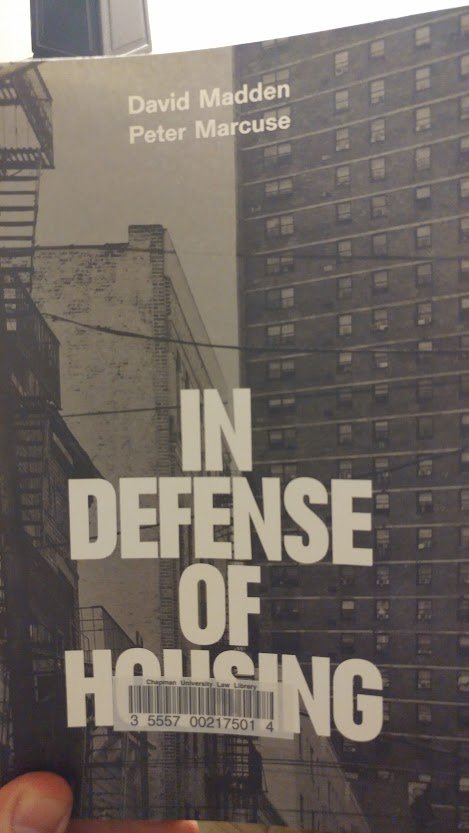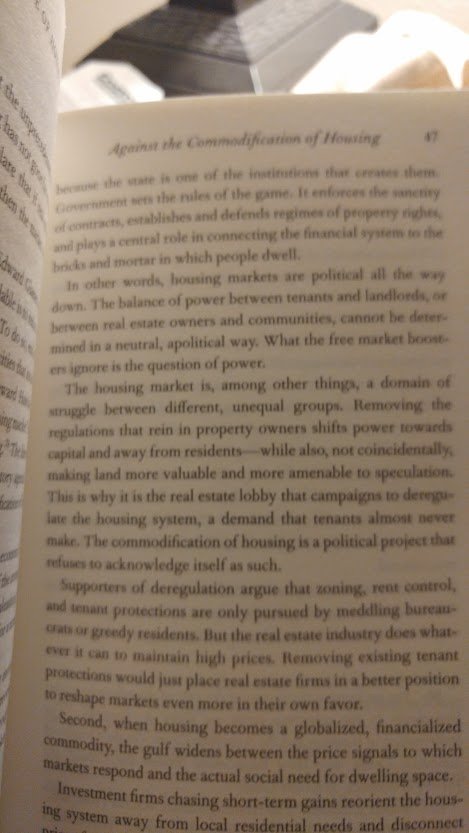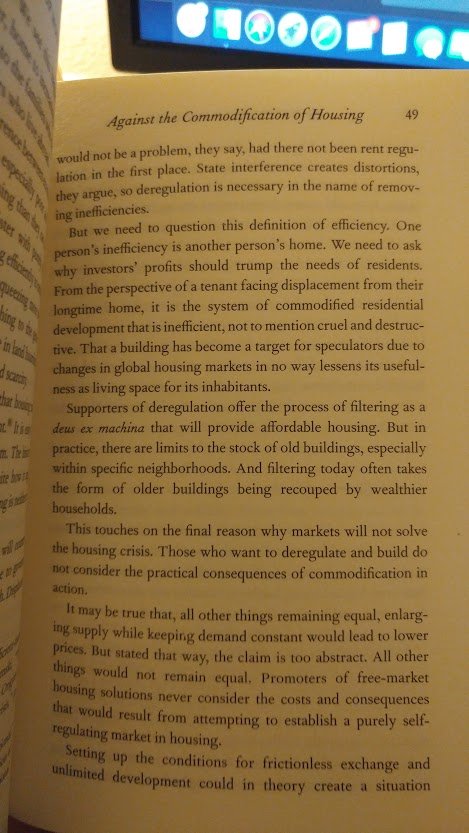In the style of @TribTowerViews I'm going to live-tweet some of my thoughts on this book: In Defense of Housing by Madden and Marcuse. So far, it's a standard diatribe against "commodification" of housing.
So the authors touch on all the greatest hits: Herbert Hoover, the mortgage industry, the FHA and HOLC, redlining, racial covenants, then later, subprime loans, predatory lending, mortgage backed securities, gentrification. No mention of zoning tho.
Now here we go: the major culprit in commodification has been "deregulation, the removal of restrictions placed on real estate as a commodity." This is clearly right as far as mortgage finance is concerned. But again, zoning is absent.
One could argue that zoning represents one way in which *regulation* has helped to commodify housing by removing its riskiness as an investment and artificially inducing its scarcity. But what do I know?
Aha! Now the authors are taking on various "defenders" of "hyper-commodification," who argue that we need to reform land use regulation and "unleash the cranes."
Now I'm getting confused. "Removing the regulations that rein in property owners shifts power toward capital and away from residents." BUT WHAT IF THE RESIDENTS ARE ALSO CAPITALISTS?
The authors here conflate homeowners with renters, and zoning reform with the abolition of protection for renters. This enables them to create a romantic idea of the "community" as anti-capitalist tenants.
This is a standard rhetorical tactic we are seeing in the opposition to #sb50 also, to pretend affluent homeowners and at-risk tenants are fundamentally the same, and to foreground the latter in order to purify the former.
So,"supporters of dereg argue that zoning, rent control [etc] are only pursued by meddling bureaucrats or greedy residents." But "removing existing tenant protections would just place real estate firms in a better position..." They just mash zoning w RC and homeowners w renters
Now for some good ol' bashing of "filtering." I'm no economist but "in practice there are limits to the stock of old bldgs." Isn't the whole point of filtering to increase the stock?
Ladies and gentlemen, this is your captain speaking. We are now arriving at the dark heart of the problem. Commodifying housing is bad bc "ability to pay is unequal while the need for a place to live is universal." So far, I could not agree more.
Here's the problem: housing's "use value" requires "continuity and stability," and therefore should not be an exchangeable commodity. Have you considered that what makes housing a valuable, exchangeable commodity is precisely the continuity and stability that zoning offers?
The pernicious thing here is the totally vacuous distinction between use value and exchange value upon which so many Marxists rest so much. These things are not opposites. They are complementary.
The exchange value of a single family home in the suburbs is a function of its use value. Its use value is determined by zoning, and hence its exchange value is as well.
When leftists insist upon this distinction, it causes them to conflate wealthy CAPITALIST homeowners with disfranchised, at-risk tenants. They are both fighting the good fight for "stability and continuity" against commodification. NO THE F*CK THEY ARE NOT.
Homeowners are not the same as at-risk tenants and zoning is not the same thing as rent control. But if we lump these together in the category of "use value" we miss that. TL;DR homeowners are capitalists. And loosening zoning ("deregulating") will thus help decommodify housing.
I think I had enough of this book for tonight. Going to kiss the kids goodnight. See you tomorrow.
Kids won't go to bed so one more thing: I had a lot more to say about Marx, use value, exchange value and local home rule here: https://papers.ssrn.com/sol3/papers.cfm?abstract_id=2592701
OK my public relations team is telling me that live-tweeting a Marxist tome on a Thursday night is not a winner.

 Read on Twitter
Read on Twitter







